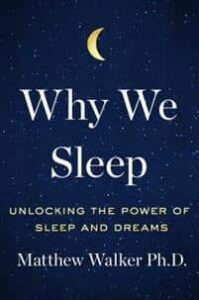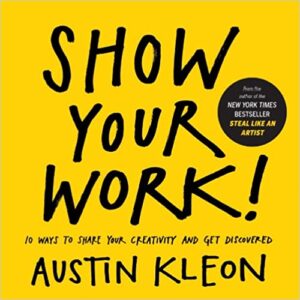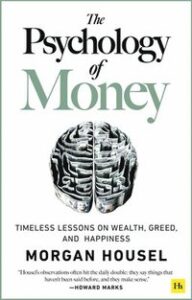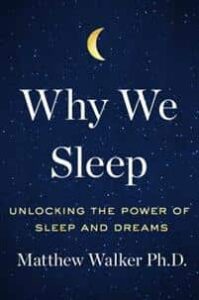Introduction
This book talks about the importance of sleep and why we should prioritize it. It talks about the different kinds of sleep and how sleep affects our life. It also gives advice on how we can have better and higher quality sleep. It turns out to sleep is the most important thing for both our mental and physical health. Enough sleep improves memory, boosts creativity and enhances our ability to learn.
1. To Sleep . . .
Around 60% of adults fail to get the recommended 7-8 hours of sleep every night. There are many dangers of not getting enough sleep. Some of them are an increased risk of diabetes, weak immune system, emotionally unstable, weight gain and heart diseases. It is shown tat the shorter you sleep, the shorter your lifespan. Sleep is the most effective way to reset our brain and body every day.
2. Caffeine, Jet Lag, and Melatonin: Losing and Gaining Control of Your Sleep Rhythm
There are two factors that determine when we want to go to sleep, our circadian rhythm and the amount of adenosine in our brain. Our circadian rhythm is a 24 hour internal clock that keeps track of the time. Melatonin gets released from our brain into our body when it starts to get dark outside which makes us tired. Melatonin level increases as the day progresses and is reset when we wake up the next morning. Adenosine is a chemical that makes us want to sleep and it builds up in our brain throughout the day. This is known as sleep pressure and it builds up throughout the day.
Caffeine makes us less tired because it blocks the adenosine receptors in our brain. Half life for a substance means the time it takes for the body to remove 50% of a substance’s concentration in our body. The half life of caffeine is 5.
Jet lag is caused because our body can’t adapt to the new time zone. It takes around 1 day for every hour for the body to adjust to the new time zone. It is easier to adapt to a new time zone when flying west than flying east. The reason for this is because its easier to stay up late than going to sleep early.
Sign that you need more sleep / is sleep deprived:
- You need an alarm clock to wake up on time.
- You can’t function optimally without caffeine.
- You can fall back asleep after sleeping 7-8 hours.
- You have difficulties remembering what you are reading (can be other causes).
3. Defining and Generating Sleep
There are two types of sleep: NREM (non-rapid eye movement) sleep and REM (rapid eye movement) sleep. NREM sleep is where our sleep is the deepest and REM where it is the lightest. We dream during REM sleep. Our muscles stops functioning during REM sleep so we don’t act out our dreams.
How we get and process new information:
- Awake State: reception – getting knowledge, experiencing and learning the world around us.
- REM sleep: integration – connecting the things we have learned when we were awake with each other and with past experiences and memories. Emotional feelings attached to past experiences are also removed here.
- NREM sleep: reflection – storing and strengthening the things we have learned. It helps us organize our memories and remove unnecessary memories.
4. Who Sleeps, How Do We Sleep, and How Much?
We can’t make up for lost sleeping time. For example if we sleep 4 hours one night we can’t fix it by sleeping 12 hours the next day.
Sleep is universal and every animal sleeps. Humans have more REM sleep than other animals. REM sleep is good for creativity.
It’s going to be more difficult to sleep well in a new and unfamiliar environment because our brain hasn’t adapted to the new place. The brain does not feel safe so half of our brain is a little awake and remains vigilant.
5. Changes in Sleep Across the Life Span
Alcohol negatively reduces the quality of our sleep, especially our REM sleep. Alcohol is one of the most powerful suppressors of REM sleep.
Sleep during childhood: Instead of sleeping the whole night, small children sleep in many short sections. It is very common for them to wake up in the middle of the night.
Sleep during teenage years: The circadian rhythm during teenage years moves forward a bit. This means they want to stay up later because the they can’t fall asleep if they go to bed early. They still need 7-8 hours of sleep just a different time. Telling a teenager to go to bed at 10 PM is like telling a adult to go to bad around 7 PM.
Sleep during adult and old age years: Older adults needs just as much sleep as adults do. The problem is that it becomes more difficult for them to get it. The older we get the more often we wake up during the night. As we age our circadian rhythm moves backward meaning that old people will go to bed earlier.
There is a strong correlation between sleep deprivation and poor memory, higher mortality rate and bad physical health in old people. Meaning if don’t sleep you have a higher chance of having a these consequences.
6. The Benefits of Sleep for the Brain
Sleep restores our capacity and ability to learn new things. The amount of things we can learn in a day is finite. When this limit is reached we need to sleep in order to restore it. This happens because sleep transfers our memories from our short term storage into our long term storage. This clear out our short term memory so we are able to learn new things the next day. This is why pulling all-nighters to study is a bad strategy. It also becomes more difficult to concentrate the more sleep deprived we are.
Sleep helps us better remember and protect new knowledge and skills we have learned during the day. Practice combined with sleep leads to improvement. If you practice a skill before going to bed, you will notice that have become better at it in the morning after a good night sleep.
7. Sleep Deprivation and the Brain
Traffic accidents caused by lack of sleep is the leading cause of death in most developed countries. The brain stops functioning optimally after around 16 hours of being awake. We then needs between 7-8 hours to recharge fully. We are in general very bad at sensing when we are sleep deprived so it’s best to keep track of how many hours we have been awake before driving. Power naps of around 10-15 min can restore concentration a little bit but that is all it does.
Lack of sleep increases the risk of getting Alzheimer, dementia and depression.
8. Cancer, Heart Attacks, and a Shorter Life: Sleep Deprivation and the Body
The shorter you sleep, the shorter you life. Lack of sleep increases the risk of cancer, heart disease and chronic pain. It also damages and weakens our immune system.
Lack of sleep also contributes to weight gain because lack of sleep will increase hunger and appetite and also decrease the feeling of being full after eating. The less you sleep the more likely you are going to over eat. Lack of sleep also causes the body to build up fat and get rid of muscles, a very bad trade off. Our physical appearance is also negatively affected by lack of sleep, we don’t look as good as we could do. Sleep deprived men also has a lower level of testosterone.
9. REM-Sleep Dreaming
The type of dreams we have can be influenced to our emotional concerns and worries. The relation is not however too strong.
10. Dreaming as Overnight Therapy
Emotional feelings attached to past experiences and memories are removed during REM sleep. This can be helpful if an experience we had was bad or traumatic.
11. Dream Creativity and Dream Control
NREM sleep strengthens our memories. REM sleep is good for creativity and problem solving because the brain connects different pieces of information together. This is why sometimes when we wake up we have come up with a solution to a problem.
12. Sleep Disorders and Death Caused by No Sleep
Insomnia is having difficulties falling asleep and staying asleep. Insomnia is often related to worry and anxiety. A human can be without sleep for around 10 days.
13. What’s Stopping You from Sleeping?
The 5 main reasons preventing us from sleep is light from electronic devices, room temperature, alcohol, caffeine and alarm clocks.
- Light from devices: Light from lamps and devices will trick us into believing that it is not night let and make us less sleepy. It is also important that our bed room is as dark as possible for the best quality sleep.
- Bedroom temperature: Our body temperature most drop down a little bit in order to fall asleep. The ideal bedroom temperature is around 18.3 degree Celsius.
- Alcohol: It disrupts our sleep meaning that we will wake up a lot during the night.
- Caffeine: It makes us less tired because it blocks the adenosine receptors in our brain.
- Alarm clocks: It is recommended to not use an alarm clock if possible. If we get woken up by an alarm clock it means that our body needed more sleep.
14. Hurting and Helping Your Sleep: Pills vs. Therapy
Sleep pills are addictive and almost always do more harm than good. It is a very short-term solution and should be avoided. The sleep quality is not as good as normal sleep and the pills damage the body.
A better approach is to visit an insomnia therapist who will help you with your problems. Some of the most common advice given are:
- Establish a regular bedtime and wake-up time, even on weekends.
- Go to bed only when sleepy.
- Never lie awake in bed for a significant period of time, around 30min.
- Avoid sleeping during the day.
- Reduce anxiety-provoking thoughts and worries.
- Remove visible clocks in the bedroom.
15. Sleep and Society: What Medicine and Education Are Doing Wrong. What Google and NASA Are Doing Right
Our body can’t recover and make up for sleep it has lost. We can’t catch up on our lost hours of sleep during the weekends. Employees and students who don’t get enough sleep have lower productivity, creativity, emotional stability and sociability. In general, the work produced are also of lower quality and contains more errors.
Companies and schools should explain to employees the importance of sleep and encourage everyone to get enough sleep. Companies should also allow for more flexible work hours. In school, classes should start later to make sure everyone gets enough sleep.
You should ask how much sleep your doctor as had if you are about to have an surgery. Just to make sure they have got enough sleep.
12 Tips for Better Sleep
- Stick to a consistent sleep schedule. Wake up and go to bed at the same time each day, including weekends.
- Exercise is great, but not too late in the day. Try to exercise 30 minutes each day, but not 2-3 hours before bedtime.
- Avoid caffeine and nicotine.
- Avoid alcoholic drinks before bed.
- Avoid large meals and beverages late at night.
- If possible, avoid medicines and medications that delay or disrupt sleep.
- Don’t take naps after 3PM
- Relax before bed. Don’t schedule too many things in the evening.
- Take a hot bath before bed. Helps cool down you body temperature.
- Dark bedroom, cool bedroom, gadget-free bedroom.
- Have the right sunlight exposure. Try to get outside and natural sunlight for at least 30 minutes each day.
- Don’t lie in bed awake. If you can’t fall asleep, try to do a relaxing activity outside of bed until you feel sleepy.





